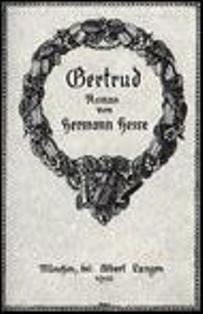 | |
| Author | Hermann Hesse |
|---|---|
| Original title | Gertrud |
| Translator | Hilda Rosner |
| Language | German |
| Genre | Philosophical novel |
| Publisher | Albert Langen |
Publication date | 1910 |
| Publication place | Germany |
Published in English | 1955 |
| Media type | Print (hardback & paperback) |
| OCLC | 1845263 |
Gertrud is a novel written by Hermann Hesse, first published in 1910. It has been published into English by Peter Owen Publishers, London.